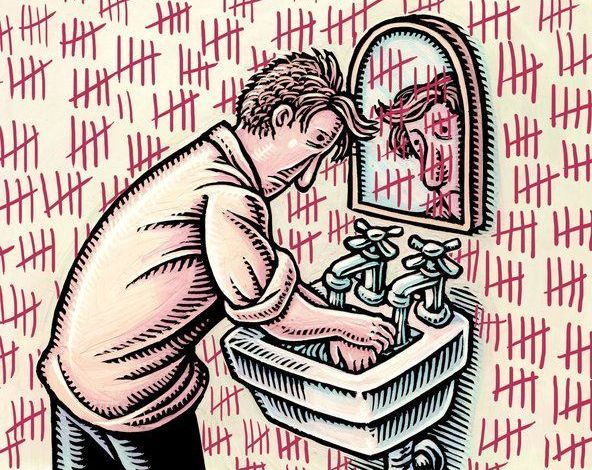If you are one of the millions of people who suffer from OCD, you know that intrusive thoughts are a common symptom. These thoughts can be disturbing and embarrassing and can make it difficult to live a normal life. It is important to understand that you are not alone, and there are ways to overcome these thoughts. In this blog post, we will discuss tips and strategies to overcome OCD intrusive thoughts.
Contents
What Are OCD Intrusive Thoughts?
OCD intrusive thoughts are unwanted, involuntary thoughts, images, or urges that trigger intensely distressing feelings. They can be about anything that causes anxiety or fear. Many people with OCD have intrusive thoughts about harm coming to themselves or others. Others may obsessively worry about contamination, germs, or becoming sick.
No matter what the content of the intrusive thought is, it creates a great deal of distress. For example, someone with OCD might have an intrusive thought about accidentally harming their child. This would cause tremendous anxiety and fear in the parent. The parent would then feel the need to do something (or several things) to “neutralize” the thought and relieve their anxiety. This might involve repeatedly checking on the child to make sure they’re safe or avoiding situations where they might be harmed.
Intrusive thoughts are a core symptom of OCD. It’s estimated that more than 90% of people with OCD experience intrusive thoughts. These unwanted thoughts can be very frightening and can make you feel like you’re losing control. They can also be persistent and hard to get rid of. If you have OCD, you may try to ignore or suppress your intrusive thoughts. But this only makes them worse. The more you try to push them away, the more powerful and distressing they become.
Reasons for OCD Intrusive Thoughts

There are many reasons for OCD’s intrusive thoughts. It can be due to:
Genetics
Genetics is one to blame for OCD intrusive thoughts. If you have a family member with OCD, you’re more likely to develop the condition. There are also many things that can make it a risk factor. Genetics is also when it comes to anxiety disorders.
Environmental Factors
If you live in a high-stress environment or have experienced a traumatic event, you’re more likely to develop OCD intrusive thoughts. This is because stress and trauma can change the way your brain works. They can also increase the levels of certain chemicals in your brain, which can make you more prone to anxiety and OCD.
Cognitive Biases
Cognitive biases are another reason for OCD’s intrusive thoughts. These are when your brain makes mistakes in the way it processes information. For example, if you have a cognitive bias towards thinking that something bad will happen, you’re more likely to have OCD intrusive thoughts about it. This is because your brain is biased towards thinking that the bad thing will happen, even if it’s unlikely.
Negative Impacts of OCD Intrusive Thoughts

There are also many negative impacts of OCD intrusive thoughts such as:
Decreases Productivity
Productivity is something that can be decreased by intrusive thoughts. This is because the more you have intrusive thoughts, the more time you’ll spend obsessing over them and trying to get rid of them. This can lead to less time being spent on productive activities.
Interference with Relationships
OCD intrusive thoughts can also interfere with your relationships. This is because they can take up a lot of your time and energy. You may find yourself avoiding situations or people that trigger your OCD intrusive thoughts. This can make it difficult to maintain close relationships.
Can Be Distressing
Intrusive thoughts can be very distressing. They can cause a great deal of anxiety and fear. They can also be hard to get rid of, which can make the distress worse. There may also be other negative emotions associated with intrusive thoughts, such as guilt, shame, and disgust.
Can Cause Avoidance
Intrusive thoughts can also cause avoidance. This is because you may try to avoid situations or people that trigger your OCD intrusive thoughts. You may also avoid talking about your intrusive thoughts for fear of being judged or misunderstood. This can lead to isolation and make it difficult to get the support you need.
Causes Disruption
Intrusive thoughts can also cause disruption. This is because they can interfere with your daily life and routine. You may find yourself missing work or school, avoiding social events, or canceling plans because of your OCD intrusive thoughts. This can make it difficult to function on a day-to-day basis.
Treatment Methods To Overcome OCD Intrusive Thoughts

Fortunately, there are many ways to overcome OCD intrusive thoughts. These include:
Cognitive-Behavioral Therapy
Cognitive-behavioral therapy (CBT) is a type of therapy that can be very helpful for treating OCD intrusive thoughts. CBT helps you to understand your thoughts and beliefs about them. It also teaches you how to change the way you think about them. This can help to reduce the power that they have over you.
Exposure and Response Prevention
Exposure and response prevention (ERP) is another type of therapy that can be helpful for treating OCD intrusive thoughts. ERP involves exposing yourself to thoughts and then not engaging in compulsions or avoidance behaviors. This can help you to learn that the thoughts are not as dangerous as you think they are.
Medication
There are also medication options that can be helpful for treating OCD intrusive thoughts. These include antidepressants, anti-anxiety medications, and antipsychotics. Medication can be very helpful for reducing the symptoms of OCD intrusive thoughts.
Support Groups
There are also support groups available for people with OCD intrusive thoughts. These groups can provide you with support and information about your condition. They can also help you to connect with other people who have similar experiences. This can be a very helpful way to reduce isolation and improve your quality of life.
Tips and Strategies to Overcome OCD Intrusive Thoughts

If you’re struggling with OCD intrusive thoughts, know that you’re not alone. Here are some tips and strategies that may help you overcome them:
Challenge Your Beliefs About The Thoughts
Just because you have an intrusive thought doesn’t mean it’s true or going to happen. You should also make it a point to challenge your beliefs about your thoughts. This means that you should question why you’re thinking of them in the first place. Are they really as dangerous as you think they are? It can also be helpful to remind yourself that thoughts are just thoughts. They’re not real.
Talk About Your Thoughts
It’s also important to talk about your intrusive thoughts with someone you trust. This can help you to understand them better and make them less distressing. It can also help to reduce the power they have over you. There are also many online resources available that can provide you with support and information about your condition.
Keep Thought Diary
A thought diary can also be helpful for managing OCD intrusive thoughts. This is a journal where you write down your thoughts as they come to you. This can help you to track your thoughts and see how they change over time. It can also help you to identify any patterns or triggers that may be causing them.
Practice Mindfulness
Mindfulness is another technique that can be helpful for managing OCD intrusive thoughts. Mindfulness involves being present at the moment and accepting things as they are. This can help you to focus on the here and now and not get caught up in your thoughts. It can also help you to become more aware of your thoughts and learn to let them go.
Seek Professional Help
This is one of the tips to overcome OCD intrusive thoughts. If you’re struggling to manage your OCD intrusive thoughts on your own, it’s important to seek professional help. There are many resources available that can help you to overcome your symptoms. You don’t have to suffer from OCD intrusive thoughts alone. With the right treatment, you can live a healthy and happy life.
Contact MantraCare for this professional help. This is an important step to take if you want to overcome OCD intrusive thoughts. We can help you to identify the problem and work on a solution that is best for you.
Focus On What’s Important
Try to focus on what’s important in your life and what makes you happy. This can help to take the focus off of your intrusive thoughts. It can also help you to feel more in control of your life. There are also many other things you can do to improve your quality of life. Seek out activities that make you happy and spend time with people who make you feel good about yourself.
Talk About Your Thoughts With Trusted Person
It’s important to talk about your OCD intrusive thoughts with a trusted person. This can help to reduce the power that they have over you. It can also help you to get support and understanding from someone who cares about you. There are also many online resources available that can provide you with support and information about your condition.
Identify Your Triggers
It can also be helpful to identify your triggers for OCD intrusive thoughts. Once you know what triggers your thoughts, you can try to avoid them or be prepared for them when they do occur. Identifying triggers also makes it easier to talk about your thoughts with others.
Conclusion
Intrusive thoughts are one of the most difficult aspects of OCD to manage. However, there are treatments and strategies that can help you overcome them. If you or someone you know is struggling with intrusive thoughts, reach out to a mental health professional for help. With treatment, it is possible to live a happy and healthy life in spite of OCD.
If you have OCD, chances are you’ve experienced intrusive thoughts at some point. Intrusive thoughts are unwanted, often disturbing thoughts that seem to pop into your head out of nowhere. They can be about anything, but they usually involve themes such as violence, sex, or harm. Many people with OCD try to suppress or ignore their intrusive thoughts, but this only makes them worse. The good news is that there are things you can do to manage your OCD intrusive thoughts. These are some tips and strategies that may help.
If you are looking for affordable Online OCD Counseling MantraCare can help: Book a trial OCD therapy session


